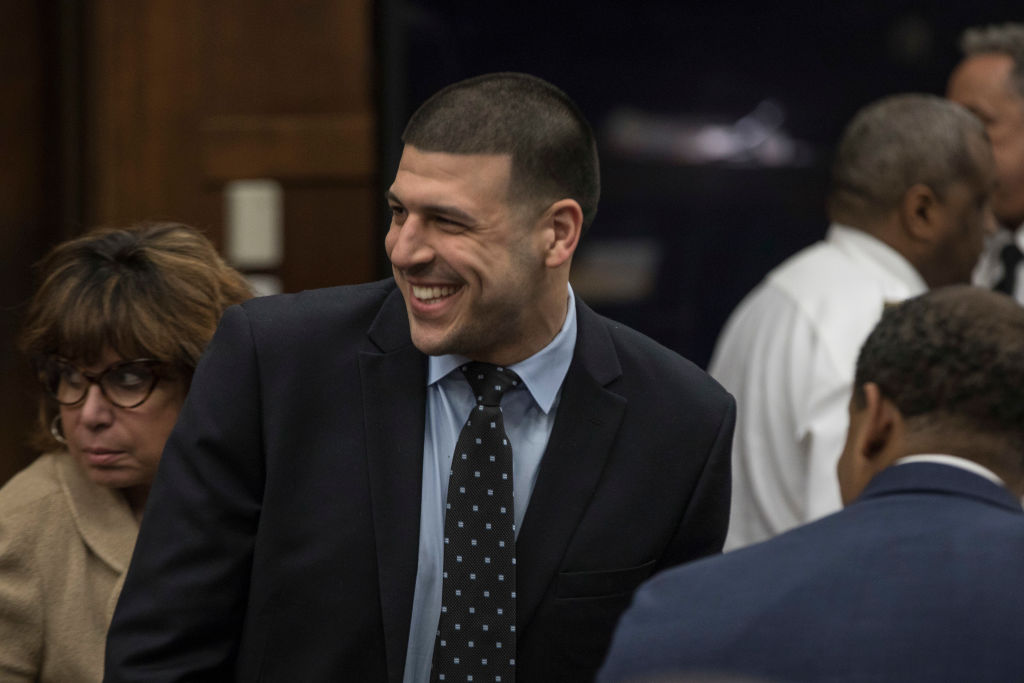Why ‘Killer Inside: The Mind of Aaron Hernandez’ on Netflix Is So Worth Watching
The life story of former Patriots player Aaron Hernandez is not an easy one to tell. Netflix recently released a docuseries about the football star’s tragic end and all of the events that lead up to it. Killer Inside: The Mind of Aaron Hernandez is a haunting, but important story, that gets a lot wider in scope than just Hernandez’s life. It launches bold claims against the NFL and the culture around it. But whether or not you agree with its arguments, Killer Inside: The Mind of Aaron Hernandez is a well-told story. Hopefully, it’s one we can learn from, too–so something like this never happens again.
Hernandez was sent to life in jail in April 2015. He was convicted of the 2013 homicide of a semi-pro football player (and his fiance’s sister’s boyfriend), Odin Lloyd. Two years later, Hernandez was acquitted of the murders of Daniel de Abreu and Safiro Furtado. But just days later, Hernandez died by apparent suicide in prison.

The documentary ‘Killer Inside: The Mind of Aaron Hernandez’ is a master class in editing
The Netflix docuseries makes a powerful argument, and a big part of that is production value. The narration of the story, from Aaron’s childhood up until his final moments, is presented in a way that is accessible to those unfamiliar with Aaron Hernandez or football in general. But it also provides new perspectives and nuanced takes to the plot for those who have followed Hernandez’s trials and tribulations from the beginning. It’s an ever-complicated, horrific story, told in a way that’s engaging, empathetic, and educational. (And that’s a hard line to walk.)
The Mind of Aaron Hernandez employs a lot of prison phone call recordings between the former NFL player and his loved ones. The recordings often play over beautiful, rolling shots of Boston, or smiling photos of Hernandez’s family members. These scenes remind us that Hernandez is human despite the horrible crimes he committed. (At once point he asks his fiance to send him the “Harry Potters;” he loves the books). It reminds us that while his childhood trauma (and brain trauma) is not an excuse for murder, no one is born a killer. It’s a tale as old and sad as time; violence begets violence.

The former Patriots player and his mother–one of the many relationships that shaped Hernandez
A particularly heart-wrenching moment in the series has to do with Hernandez with his mother, with whom he has a tempestuous relationship. The interviewees explain that leading up to the Patriots playing in the Super Bowl, Aaron Hernandez visited the school where his mother worked. The documentary shows footage from the day he visited. Hernandez gave a speech to the elementary school kids, who cheered wildly and held up handmade signs.
The documentary zooms in on Hernandez’s mother’s face, watching her son speak, her eyes tearing up as she listens. Simultaneously, we hear a recording of a phone call of Hernandez with his mother. It’s a perfect juxtaposition of the pride she felt on the day in the school, versus the bitterness they spew at each other on the call. It portrays, (in a way that’s entirely clear, but doesn’t beat you over the head with it), that relationships, and humans, are terribly complicated things.
The scene is also a perfect representation of the series Killer Mind: The Mind of Aaron Hernandez itself. On one hand, Hernandez’s life is idyllic: he has inherent good looks and a knack for athletics; eventually, he gets a $40 million contract with one of the winningest teams in the NFL; he has a beautiful fiance and an adorable daughter. On the other hand, his life was a disaster; childhood trauma, injuries, what appears to be drug addiction, impulsiveness, and eventually, literal homicide. The Netflix series presents a powerful case for a tried and true concept: what appears bright and shiny on the surface often has a dark, dirty underbelly. Take the NFL, for example.

Aaron Hernandez, the NFL, and CTE in football players
The Mind of Aaron Hernandez takes a deep dive into CTE, and the effects it’s had on NFL players past and present. Hernandez, after his death, was diagnosed with a severe case of CTE.
Former 49ers player Chris Borland appears in the documentary, as well; he quit the NFL after one year because of the lack of care for concussions and other injuries. Borland ultimately chose his brain health over his career.
“They’re not in the health business, they’re in the violence business,” he argues of the NFL in the Netflix series.
Borland also makes the bold claim that the NFL–no matter what they say publicly–is not interested in the health of their players behind the scenes.
“No matter whether or not they’re throwing a flag or claiming concussions are down, or taking players into the blue tent, the reason football is the most popular sport is because it’s violent,” Borland says.

The documentary about Aaron Hernandez is deeply, terribly sad. But it’s a story that needs to be told–and in the careful, nuanced way that Netflix does.
How to get help: In the U.S., call the National Suicide Prevention Lifeline at 1-800-273-8255. Or text HOME to 741-741 to connect with a trained crisis counselor at the free Crisis Text Line.


